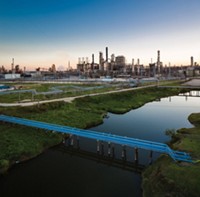Advertisement
Grab your lab coat. Let's get started
Welcome!
Welcome!
Create an account below to get 6 C&EN articles per month, receive newsletters and more - all free.
It seems this is your first time logging in online. Please enter the following information to continue.
As an ACS member you automatically get access to this site. All we need is few more details to create your reading experience.
Not you? Sign in with a different account.
Not you? Sign in with a different account.
ERROR 1
ERROR 1
ERROR 2
ERROR 2
ERROR 2
ERROR 2
ERROR 2
Password and Confirm password must match.
If you have an ACS member number, please enter it here so we can link this account to your membership. (optional)
ERROR 2
ACS values your privacy. By submitting your information, you are gaining access to C&EN and subscribing to our weekly newsletter. We use the information you provide to make your reading experience better, and we will never sell your data to third party members.
Business
SABIC, Sinopec Eye Plant In Trinidad
Caribbean: Firms are the latest to try to make chemicals on the island nation
by Alexander H. Tullo
February 14, 2012
Saudi Basic Industries Corp. (SABIC) and China’s Sinopec have entered negotiations with the government of Trinidad & Tobago for a $5.3 billion methanol-to-olefins complex that would be built on the island nation.
In a filing with the Saudi stock exchange, SABIC disclosed that the negotiations are meant to define terms of natural gas supply from Trinidad’s state oil company. The government of Trinidad had received proposals for gas-based projects from other firms as well.
Although Trinidad is host to methanol and nitrogen fertilizer firms such as Methanex and Koch Industries, the country’s goal of establishing a more diverse petrochemical industry has proved elusive. In 2006, Westlake Chemical unveiled plans to build a $1.5 billion complex that would convert ethane into ethylene and polyethylene. But the company shelved its project in 2009, citing “several major constraints.”
Rather than ethane, SABIC and Sinopec would tap into Trinidad’s vast methane reserves to make olefins and downstream derivatives. Such methanol-to-olefins processes are relatively new. Air Liquide’s Lurgi engineering unit and Honeywell’s UOP licensing business both offer technologies. Thus far, most of the interest has come from Chinese firms aiming to derive chemicals from domestic coal reserves.
SABIC and Sinopec are no strangers. In 2010, the companies started up an ethylene cracker and derivatives complex in Tianjin, China. The pair plans to build a polycarbonate plant on the Tianjin site by 2015.



Join the conversation
Contact the reporter
Submit a Letter to the Editor for publication
Engage with us on Twitter